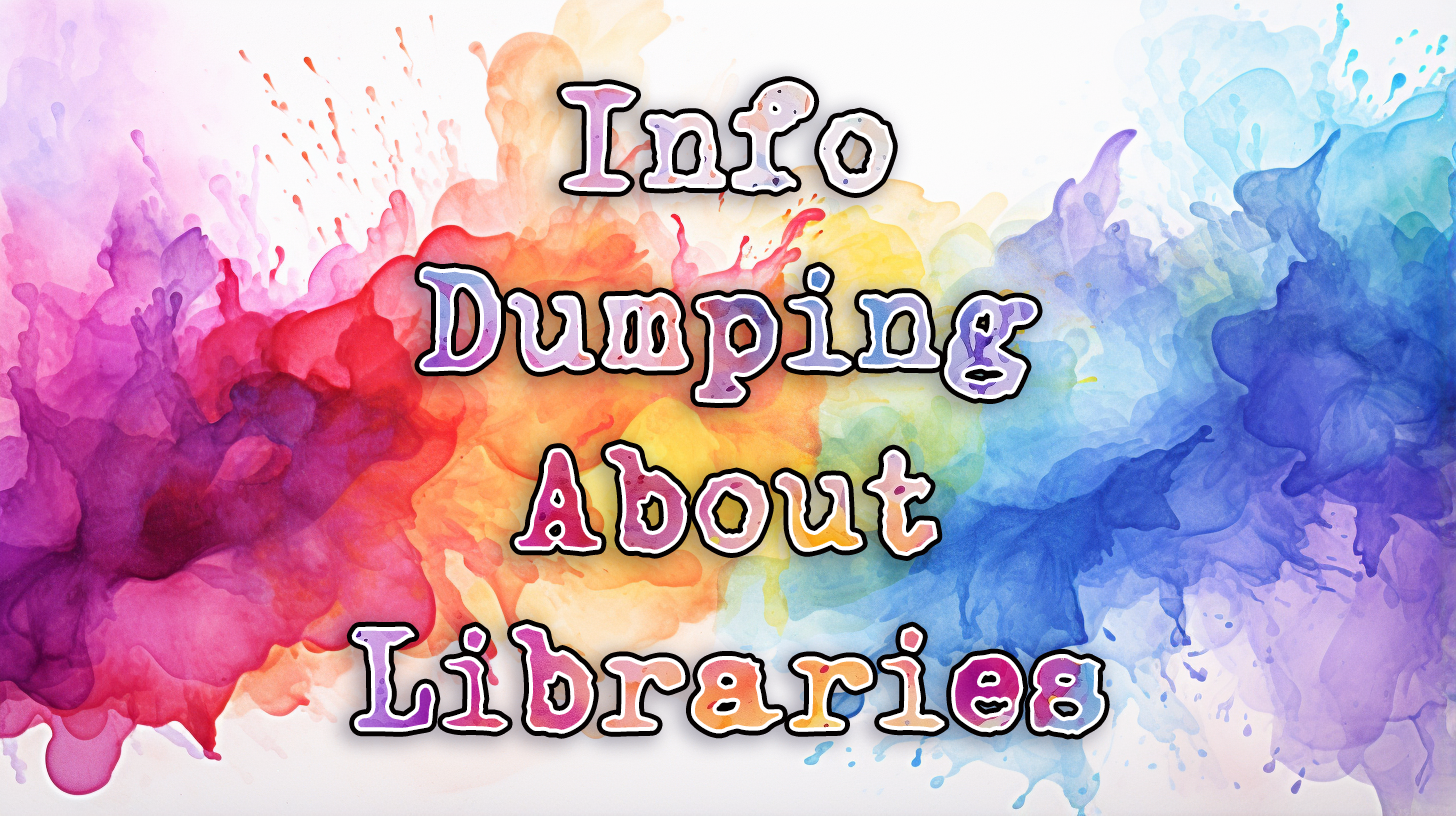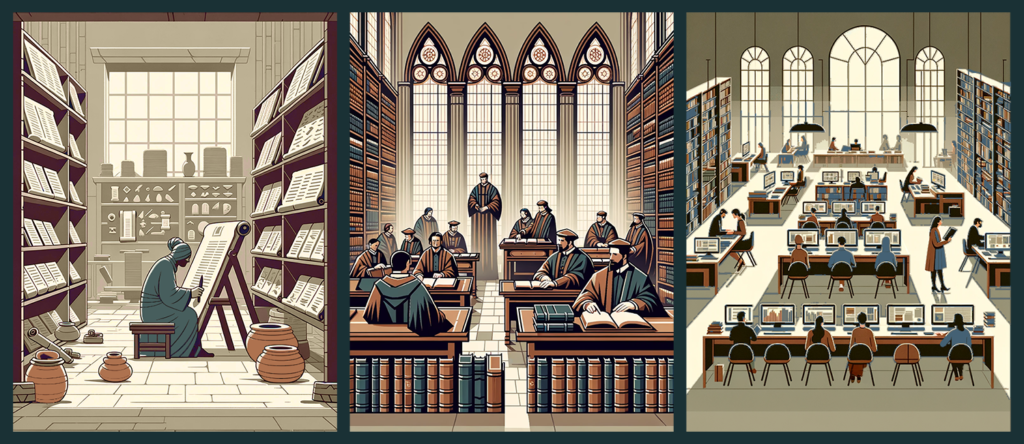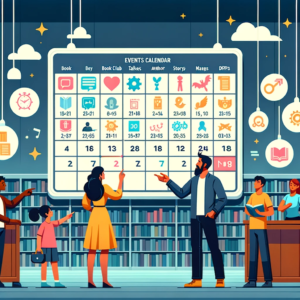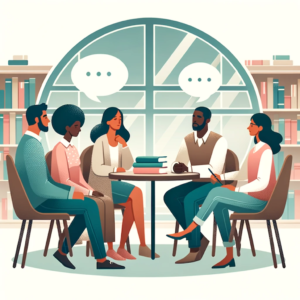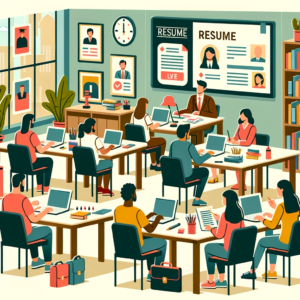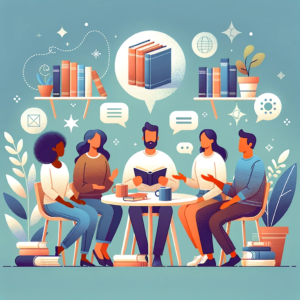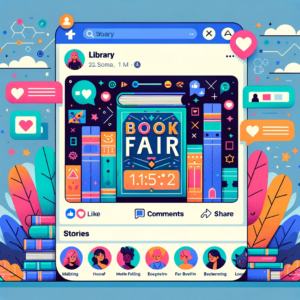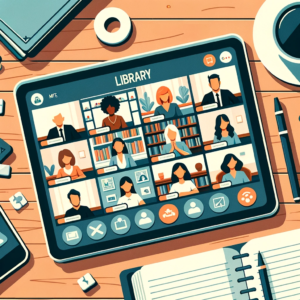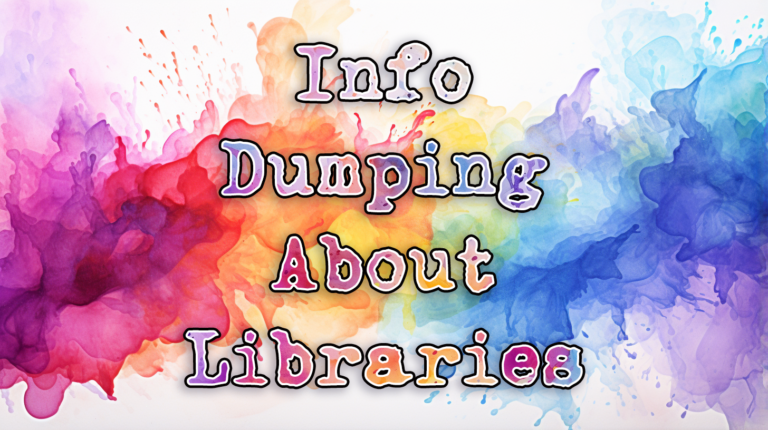Imagine a place where community engagement isn’t just a buzzword, but an active, ongoing part of daily activities. Picture a dynamic space where people gather to connect, discuss, and grow as a community. This might sound like an idealistic dream, but it’s a reality that’s probably just a short walk or a quick drive from your home. Yes, I’m info-dumping again about the library — a place where libraries and community engagement intersect in the most enriching ways.
Far from being just repositories of books and quiet reading spaces (as if that wasn’t enough!), today’s public libraries have transformed into bustling cultural centers that host local events, foster community dialogue, and offer a wide array of community services. Libraries are changing how they serve communities by promoting civic engagement and inclusivity. They’re not just surviving in the age of digital information; they’re thriving as crucial centers for community outreach and engagement.
Let’s dive into the multifaceted ways in which libraries are not merely serving, but energizing communities across the globe.
The Foundations of Community: A Historical Look at Libraries
Enlightenment and Public Access: The Evolution of Libraries
Ah, libraries! Those hallowed halls filled with the musky scent of aged paper and the whispered excitement of discovering something new. The library, as a concept, has been around for millennia? Libraries were the Google of the past, holding a wealth of human knowledge. In ancient civilizations like Mesopotamia and Egypt, libraries were places where scribes and thinkers gathered to study scrolls and tablets.
Libraries have never been just about books. These spaces have served as meeting points for both intellectual and social activities within the community. Take, for example, the Library of Alexandria, which wasn’t merely a collection of scrolls; it was a meeting ground for scholars, filled with lecture halls and study rooms.
In Medieval Europe, monastic libraries were the guardians of literacy and knowledge, but they were also centers for spiritual contemplation and community dialogue. Monks meticulously copied manuscripts by hand in scriptoriums, preserving religious and classical texts. Access was largely reserved for clergy and scholars. Despite their exclusivity, these monastic libraries served as vital scholarly havens in an age when literacy was rare. It’s intriguing that the library, an institution we associate with open access and community, had such exclusive origins.
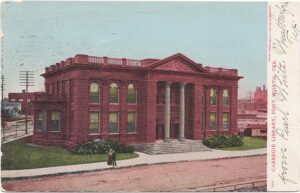
“A library outranks any other one thing a community can do to benefit its people. It is a never failing spring in the desert.”
Andrew Carnegie
Public libraries became popular in the US in the 19th century, thanks to supporters like Andrew Carnegie. These libraries were designed not just to lend books but to elevate public discourse, citizenship, and social inclusion.
The role of libraries as community hubs isn’t new; it’s deeply rooted in their history. But the ways in which they foster community engagement have evolved dramatically, especially in the last few decades. From being places where you went to escape the world, libraries have transformed into spaces that help you engage with it. They are more than just rooms full of books; they are dynamic platforms for local events, educational programs, and so much more.
The Modern Library: A Renaissance in Community Engagement
Beyond Books: The Services You Didn’t Know Libraries Offer
You’ve explored ancient libraries with me, maybe even stopped to enjoy the scent of imaginary parchment (ah, the joys of bibliosmia!). But don’t get too lost in nostalgia, because modern libraries are just as magical, albeit in a 21st-century way.
Gone are the days when libraries were only about borrowing a dusty tome or two. Today’s libraries are dynamic, multifaceted community hubs that offer an astounding array of services. You might walk in to print a document and walk out with a newfound interest in local art, thanks to a community exhibit. You could attend a coding workshop on one floor and find a cozy knitting circle on another.
Libraries today are also critical centers for community outreach. They exceed expectations by assisting with job searches, providing free internet access, and loaning tools or musical instruments. Yes, you read that right; some libraries let you borrow a guitar or a drill, just like you would a book!
Libraries have evolved to become true microcosms of society, mirroring the diversity and complexity of the communities they serve. They have transformed into collaborative spaces for civic discussions, local events, and social inclusion initiatives. So, if you’re still stuck on the image of a library as just a quiet place full of books, it’s high time for a visit to your local haven of community building.
Libraries and Community Engagement: More Than Just Books, It’s About Events
Why Libraries are the Epicenters of Community Activity
We’ve examined how libraries have played transformative roles in our communities, both in the past and present. But there’s another aspect of libraries that often goes unnoticed, yet is vital for bringing the community together—local events. Libraries are not just storehouses of knowledge; they are dynamic, pulsating centers of cultural and civic activities.
Imagine walking into your local library and finding a poster about an upcoming author’s reading. The next week, it could be a cooking demonstration, and the week after that, a community discussion on climate change. Libraries have gracefully taken on the role of cultural centers, hosting an array of events that cater to diverse interests and age groups.
These events are not just for entertainment or education; they serve a deeper purpose. They bring people together, sparking conversations that might not have occurred otherwise. Through this, libraries create spaces for community dialogue and promote understanding and inclusion.
For families, the library might host Saturday morning storytelling sessions or craft workshops for kids. For adults, there could be job-search workshops, financial literacy programs, or even speed dating events for book lovers! These events transcend conventional library services, contributing to civic engagement and social inclusion.
Libraries have expanded their roles to become the true epicenters of community activity. They act as gathering places where the community can engage, learn, and grow together, all under one roof.
Fostering Conversations: How Libraries Promote Community Dialogue
Libraries Engage Community Discussions
In a world that often feels more divided than ever, libraries are stepping up to fill a crucial role. They’re not just places to borrow a book or use a computer; they’re spaces where meaningful dialogues are sparked and understanding is nurtured. Think of your local library as a kind of ‘community living room’—a place where everyone is invited to engage in conversations that matter.
From book club debates to guest speakers, libraries are fostering critical community discussions. These aren’t just casual chats. These discussions aim to broaden perspectives and deepen understanding of our diverse world.
And it’s not just the adult patrons who benefit. Many libraries offer programs specifically geared toward helping younger generations engage in meaningful discourse. From student debates to youth councils, these initiatives empower the community’s youngest members to have their voices heard, contributing to a culture of civic engagement that spans multiple generations.
But what makes these dialogues truly impactful is the wealth of resources that libraries offer to inform them. Before or after a community discussion, you can easily pick up a book or access an online resource to deepen your understanding of the topic at hand. It’s this combination of dialogue and readily available information that positions libraries as critical centers for community understanding.
So, the next time you walk into your local library, take a moment to check out their events calendar or speak with a librarian. You might just find an opportunity to not only expand your own understanding but also to contribute to a richer, more empathetic community.
Libraries: The Unsung Heroes of Educational Equity
Workshops, Classes, and More: Libraries as Learning Centers
From storytime sessions that open young minds to job training classes that empower adults, libraries are nurturing spaces for learning at every age. Within their walls, a thriving ecosystem of educational programs and initiatives takes root, each one aimed at fostering personal and educational growth across a diverse age spectrum.
For children, libraries are magical places where the building blocks of literacy are laid. maginative puppet shows not only entertain but also introduce early reading concepts, while interactive science workshops feed youthful curiosity and stimulate a sense of wonder and discovery. By making learning joyful, libraries sow the seeds of a lifelong love for learning and exploration.
Adults are students here too. Libraries democratize access to lifelong learning through free programs covering topics from technology to arts to financial literacy. Aspiring creatives can hone their craft in painting classes, while job seekers can gain skills at resume workshops. Seniors can explore new hobbies or brush up on computer basics at their own pace.
Libraries also break down barriers through targeted educational initiatives. English as a Second Language (ESL) classes offer invaluable support to new immigrants, helping newcomers find their footing, while dedicated teen spaces provide everything from homework help and college prep resources to Dungeons & Dragons clubs. By meeting people where they are, libraries empower diverse communities through knowledge.
And it doesn’t stop there. Special needs programs, adult literacy courses, coding camps, small business workshops – libraries offer an ever-expanding universe of learning opportunities. Their mission is simple yet profound: to nurture the potential of every person who walks through their doors.
Woven through it all is a single, unwavering vision: to nurture the potential of every person who walks through their doors. Libraries don’t just collect information; they set it free through human connections. They are ecosystems where we grow together.
The Library as a Sanctuary: Community Support in Times of Need
How Libraries Extend a Helping Hand to Vulnerable Populations
Libraries play a crucial role as safe havens in communities. Far more than just rooms of books, libraries stand as beacons of hope for our most vulnerable populations. Within their walls, those facing homelessness, poverty, or crisis can find refuge, support, and new beginnings.
Libraries provide support for job seekers, families in need, and unhoused people looking for help. Libraries offer support to people in need with services like counseling, food aid, health resources, and temporary shelter.
Libraries are also instrumental in bridging the employment gap. Notice that focused patron at the computer drafting their résumé? Libraries provide free internet access for job searches and offer workshops on interview skills and job readiness.
For individuals experiencing homelessness, libraries offer more than just a warm place to stay. They provide a range of services, from access to computers for job searching to specialized social service programs. In doing so, libraries become a lifeline, connecting vulnerable populations to essential resources.
And in times of community-wide crisis, libraries transform into critical support centers. When disasters strike, they provide emergency communication, information access, device charging, and basic necessities. During the COVID-19 pandemic, many libraries doubled down on their roles as lifelines, delivering groceries, job search assistance, mental health resources, and virtual storytimes to isolated households.
For the most vulnerable members of society, libraries can make the difference between sinking and swimming. By welcoming all and meeting people’s most basic needs, they affirm that every life has value and everyone deserves safety. Even as the world changes, libraries continue standing strong as places of refuge and hope for those who need it most. They are living proof of our shared humanity.
Social Synergy: How Libraries Foster Community Connections
Book Clubs, Language Exchanges, and the Human Element
As we dive even deeper into the ways libraries are the pulse of community engagement, let’s explore how libraries are the backdrop for friendships, cultural exchanges, and the kind of human connections that enrich our lives.
While libraries provide educational and practical resources, their role as social facilitators is just as vital for fostering community. Within library walls, meaningful connections bloom through an array of social groups and activities that cater to diverse populations.
Looking to meet fellow bookworms? Join a library book club, where stimulating discussions unlock deeper insights into our shared human experience. Seeking to practice conversational English? Libraries offer language exchange partners and conversation groups to help new immigrants get acclimated. Are friendships and fun what you need? From youth gaming and anime clubs to seniors’ afternoon tea hours, libraries thoughtfully bring people together through common interests and casual camaraderie.
Libraries also host activities that connect people across generational lines. A teen manga lover and an elderly historian might strike up an unlikely friendship over a manga drawing workshop. Intergenerational book buddies programs pair youths with senior patrons for reading enrichment. Chess clubs unite young and old over a shared passion.
For those facing isolation, libraries provide a lifeline. Book delivery services connect homebound seniors with friendly visitors. Support groups give struggling teens a safe space to be themselves. Veterans find community in library-organized hobby clubs and peer discussions.
And in our increasingly disconnected world, these in-person social circles fill an important void. Through library groups, people forge bonds through activities they enjoy. But more than just hobbies are shared; empathy and understanding grow. Within those walls, friendships form that can last a lifetime.
By facilitating meaningful social engagement, libraries weave threads of connection that bind yet strengthen our communities. They remind us that, despite our differences, our shared humanity unites us all.
While the digital revolution has granted many of us boundless access to information, too many individuals still find themselves on the wrong side of the digital divide. Public libraries stand at the forefront of bridging this gap through tech resources that empower communities.
The Digital Dimension: Libraries in the Internet Age
How Libraries are Adapting to a Digital World
Libraries have evolved to become dual citizens of both the physical and digital worlds, seamlessly integrating the two to foster a more inclusive and dynamic form of community engagement. While the digital revolution has granted many of us boundless access to information, too many individuals still find themselves on the wrong side of the digital divide. Public libraries stand at the forefront of bridging this gap through tech resources that empower communities.
As I’ve explored in a previous article, libraries offer a robust array of digital services, from public computers to STEM programs. But libraries don’t just provide the hardware and wifi; they offer guidance on using technology effectively and responsibly. Digital literacy programs help youths, seniors, low-income households, and other underserved groups gain tech proficiency.
Libraries are also jumping on the social media bandwagon, creating virtual communities that extend the conversations initiated in their physical spaces. Follow your library’s Facebook page for event announcements, book reviews, and more.
And libraries are taking engagement online through virtual workshops and webinars. From coding classes to book clubs, these online platforms make community participation accessible from home. They’re perfect for days when you can’t leave the house but want to connect.
As pillars of digital inclusion, libraries ensure technology serves communities accessibly and equitably. They supply the tools while keeping the human connections alive. Their array of evolving programs continues meeting each challenge with compassion and innovation at the core.
Looking Forward: The Future of Libraries in Community Engagement
Innovations on the Horizon: What to Expect from Tomorrow’s Libraries
Libraries have continuously adapted over decades to better serve their communities, from the first lending libraries to omnipresent digital resources. This begs the question: What’s next for libraries in bolstering community engagement?
The future points to bolder reinvention of physical spaces to enrich experiences, from sustainable building innovations to creative multimedia labs. Expect to see greater integration of emerging technologies like virtual and augmented reality that make engagement interactive. More personalized digital platforms may track reading profiles and facilitate customized community-building.
And libraries will keep venturing beyond their walls to reach more people. We’ll see more mobile libraries, pop-up events, and creative collaborations with local organizations. These efforts will make libraries radically accessible, bringing communities together at an even deeper, more inclusive level.
The possibilities are endless. But one thing remains constant – the unwavering commitment of libraries to evolve along with community needs. As long as they listen to the communities they serve, libraries will continue pushing the boundaries of what a library can be. They have always been engines of connection and growth. With inspired vision, that transformation story continues being written each day.
The Heart of Community
Over the decades, libraries have adapted to meet changing needs while staying true to their core purpose: strengthening communities. Whether through books or computers, story times or skills classes, libraries bring people together to learn, grow, and support one another. They provide accessible resources for self-improvement and spaces for civic discourse. By serving vulnerable populations and facilitating connections across differences, libraries foster empathy and human growth.
Libraries show that real community stems from inclusivity, shared purpose, and human care. They are stewards of knowledge, safety nets in hard times, and “community living rooms” where meaningful bonds are forged. And as new challenges arise, libraries continue serving as the heart of community – a vital space for humanity to come together.
tl;dr – I just really like libraries and I think they are cool.


